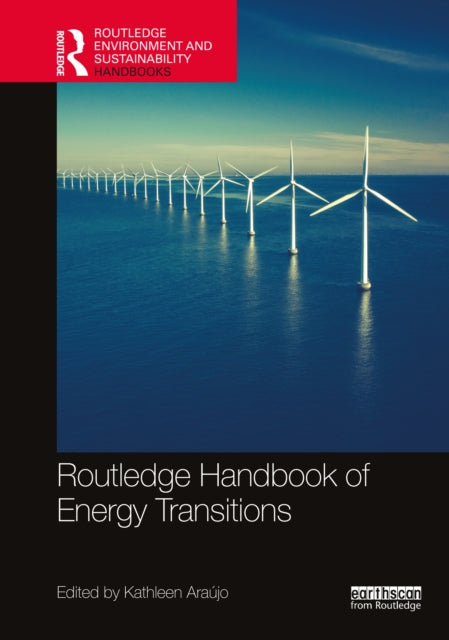Shulph Ink
Routledge Handbook of Energy Transitions
Routledge Handbook of Energy Transitions
YOU SAVE £9.84
- Condition: Brand new
- UK Delivery times: Usually arrives within 2 - 3 working days
- UK Shipping: Fee starts at £2.39. Subject to product weight & dimension
Bulk ordering. Want 15 or more copies? Get a personalised quote and bigger discounts. Learn more about bulk orders.
Couldn't load pickup availability
- More about Routledge Handbook of Energy Transitions
The Routledge Handbook of Energy Transitions explores the expanding field of energy transitions, recognizing the significant changes underway in energy sourcing, delivery, and utilization. Employing a sociotechnical approach, the Handbook considers contemporary ideas and practices across economics, engineering, innovation, policy, and management. It addresses pressing issues such as infrastructure choices, the role of food systems and materials, sustainability, and energy democracy. The book explores disruption through topics like digitalization, extreme weather, and COVID-19, highlighting regional similarities and differences. It serves as an authoritative roadmap for students, policymakers, researchers, and practitioners, connecting ideas, offering empirical insights, and challenging the theory and practice of energy systems change.
Format: Hardback
Length: 496 pages
Publication date: 30 December 2022
Publisher: Taylor & Francis Ltd
The Routledge Handbook of Energy Transitions is a comprehensive and multidisciplinary exploration of the rapidly evolving field of energy transitions. Drawing upon a diverse network of experts from around the world, this handbook recognizes the significant changes underway in the modes of energy sourcing, delivery, and utilization. Employing a sociotechnical approach that encompasses economics, engineering, innovation, policy, planning, and management, the volume delves into contemporary ideas and practices that define the field.
The book addresses pressing issues such as infrastructure choices, the role of food systems and materials, sustainability, and energy democracy. It explores the impact of digitalization, extreme weather events, and the COVID-19 pandemic on energy systems, while also examining regional similarities and differences. Disruption serves as a central theme throughout, with the authors examining topics such as digitalization, extreme weather, and COVID-19, alongside regional similarities and differences.
Overall, the Routledge Handbook of Energy Transitions serves as an authoritative roadmap for energy systems change. It connects ideas, provides empirical insights, and challenges prevailing perspectives on energy theory and practice. This innovative volume holds relevance for students, policymakers, researchers, and practitioners engaged in energy transitions, planning, environmental management and policy, sustainable business, engineering, science and technology studies, political science, geography, design anthropology, and environmental justice.
The book is organized into nine chapters, each authored by leading experts in their respective fields. Chapter 1 provides an introduction to the handbook and sets the stage for the subsequent chapters. Chapter 2 explores the drivers and challenges of energy transitions, while Chapter 3 examines the role of technology in shaping energy systems. Chapter 4 examines policy and governance frameworks for energy transitions, Chapter 5 explores the economic aspects of energy transitions, Chapter 6 explores the social dimensions of energy transitions, Chapter 7 examines the environmental impacts of energy transitions, Chapter 8 explores the role of cities in energy transitions, Chapter 9 examines the role of renewable energy in energy transitions, and Chapter 10 explores the role of energy storage in energy transitions.
In conclusion, the Routledge Handbook of Energy Transitions is a vital resource for anyone interested in understanding and navigating the complex field of energy transitions. By bringing together a diverse range of perspectives and expertise, this handbook provides a comprehensive and interdisciplinary understanding of the challenges and opportunities associated with energy systems change. It serves as a valuable guide for students, policymakers, researchers, and practitioners seeking to advance the field and contribute to a more sustainable and resilient future.”
Weight: 1130g
Dimension: 246 x 174 (mm)
ISBN-13: 9781032023502
This item can be found in:
UK and International shipping information
UK and International shipping information
UK Delivery and returns information:
- Delivery within 2 - 3 days when ordering in the UK.
- Shipping fee for UK customers from £2.39. Fully tracked shipping service available.
- Returns policy: Return within 30 days of receipt for full refund.
International deliveries:
Shulph Ink now ships to Australia, Belgium, Canada, France, Germany, Ireland, Italy, India, Luxembourg Saudi Arabia, Singapore, Spain, Netherlands, New Zealand, United Arab Emirates, United States of America.
- Delivery times: within 5 - 10 days for international orders.
- Shipping fee: charges vary for overseas orders. Only tracked services are available for most international orders. Some countries have untracked shipping options.
- Customs charges: If ordering to addresses outside the United Kingdom, you may or may not incur additional customs and duties fees during local delivery.


